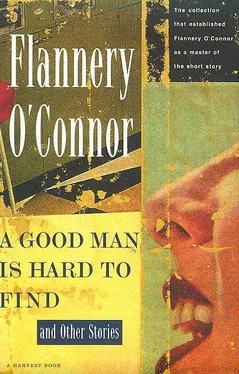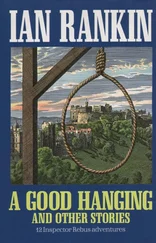“She had her arm around it in the coffin,” Mrs. Pritchard went on, but her voice was drowned out by the sound of the tractor that the Negro, Culver, was driving up the road from the barn. The wagon was attached and another Negro was sitting in the back, bouncing, his feet jogging about a foot from the ground. The one on the tractor drove it past the gate that led into the field on the left.
Mrs. Cope turned her head and saw that he had not gone through the gate because he was too lazy to get off and open it. He was going the long way around at her expense. “Tell him to stop and come here!” she shouted.
Mrs. Pritchard heaved herself from the chimney and waved her arm in a fierce circle but he pretended not to hear. She stalked to the edge of the lawn and screamed, “Get off, I toljer! She wants you!”
He got off and started toward the chimney, pushing his head and shoulders forward at each step to give the appearance of hurrying. His head was thrust up to the top in a white cloth hdt streaked with different shades of sweat. The brim was down and hid all but the lower parts of his reddish eyes.
Mrs. Cope was on her knees, pointing the trowel into the ground. “Why aren’t you going through the gate there?” she asked and waited, her eyes shut and her mouth stretched flat as if she were prepared for any ridiculous answer.
“Got to raise the blade on the mower if we do,” he said and his gaze bore just to the left of her. Her Negroes were as destructive and impersonal as the nut grass.
Her eyes, as she opened them, looked as if they would keep on enlarging until they turned her wrongsideout. “Raise it,” she said and pointed across the road with the trowel.
He moved off.
“It’s nothing to them,” she said. “They don’t have the responsibility. I thank the Lord all these things don’t come at once. They’d destroy me.”
“Yeah, they would,” Mrs. Pritchard shouted against the sound of the tractor. He opened the gate and raised the blade and drove through and down into the field; the noise diminished as the wagon disappeared. “I don’t see myself how she had it in it,” she went on in her normal voice.
Mrs. Cope was bent over, digging fiercely at the nut grass again. “We have a lot to be thankful for,” she said. “Every day you should say a prayer of thanksgiving. Do you do that?”
“Yes’m,” Mrs. Pritchard said. “See she was in it four months before she even got thataway. Look like to me if I was in one of them, I would leave off… how you reckon they… ?”
“Every day I say a prayer of thanksgiving,” Mrs. Cope said. “Think of all we have. Lord,” she said and sighed, “we have everything,” and she looked around at her rich pastures and hills heavy with timber and shook her head as if it might all be a burden she was trying to shake off her back.
Mrs. Pritchard studied the woods. “All I got is four abscess teeth,” she remarked.
“Weft, be thankful you don’t have five,” Mrs. Cope snapped and threw back a clump of grass. “We might all be destroyed by a hurricane. I can always find something to be thankful for.”
Mrs. Pritchard took up a hoe resting against the side of the house and struck lightly at a weed that had come up between two bricks in the chimney. “I reckon you can,” she said, her voice a little more nasal than usual with contempt.
“Why, think of all those poor Europeans,” Mrs. Cope went on, “that they put in boxcars like cattle and rode them to Siberia. Lord,” she said, “we ought to spend half our time on our knees.”
“I know if I was in an iron lung there would be some things I wouldn’t do,” Mrs. Pritchard said, scratching her bare ankle with the end of the hoe.
“Even that poor woman had plenty to be thankful for,” Mrs. Cope said.
“She could be thankful she wasn’t dead.”
“Certainly,” Mrs. Cope said, and then she pointed the trowel up at Mrs. Pritchard and said, “I have the best kept place in the county and do you know why? Because I work. I’ve had to work to save this place and work to keep it.” She emphasized each word with the trowel. “I don’t let anything get ahead of me and I’m not always looking for trouble. I take it as it comes.”
“If it all come at oncet sometime,” Mrs. Pritchard began.
“It doesn’t all come at once,” Mrs. Cope said sharply.
The child could see over to where the dirt road joined the highway. She saw a pick-up truck stop at the gate and let off three boys who started walking up the pink dirt road. They walked single file, the middle one bent to the side carrying a black pig-shaped valise.
“Well, if it ever did,” Mrs. Pritchard said, “it wouldn’t be nothing you could do but fling up your hands.”
Mrs. Cope didn’t even answer this. Mrs. Pritchard folded her arms and gazed down the road as if she could easily enough see all these fine hills flattened to nothing. She saw the three boys who had almost reached the front walk by now “Lookit yonder,” she said. “Who you reckon they are?”
Mrs. Cope leaned back and supported herself with one hand behind her and looked. The three came toward them but as if they were going to walk on through the side of the house. The one with the suitcase was in front now. Finally about four feet from her, he stopped and set it down. The three boys looked something alike except that the middle-sized one wore silver-rimmed spectacles and carried the suitcase. One of his eyes had a slight cast to it so that his gaze seemed to be coming from two directions at once as if it had them surrounded. He had on a sweat shirt with a faded destroyer printed on it but his chest was so hollow that the destroyer was broken in the middle and seemed on the point of going under. His hair was stuck to his forehead with sweat. He looked to be about thirteen. All three boys had white penetrating stares. “I don’t reckon you remember me, Mrs. Cope,” he said.
“Your face is certainly familiar,” she murmured, scrutinizing him. “Now let’s see…”
“My daddy used to work here,” he hinted.
“Boyd?” she said. “Your father was Mr. Boyd and you’re J. C.?”
“Nome, I’m Powell, the secont one, only I’ve growed some since then and my daddy he’s daid now. Done died.”
“Dead. Well I declare,” Mrs. Cope said as if death were always an unusual thing. “What was Mr. Boyd’s trouble?”
One of Powell’s eyes seemed to be making a circle of the place, examining the house and the white water tower behind it and the chicken houses and the pastures that rolled away on either side until they met the first line of woods. The other eye looked at her. “Died in Florda,” he said and began kicking the valise.
“Well I declare,” she murmured. After a second she said, “And how is your mother?”
“Mah’d again.” He kept watching his foot kick the suitcase. The other two boys stared at her impatiently.
“And where do you all live now?” she asked.
“Atlanta,” he said. “You know, out to one of them developments.”
“Well I see,” she said, “I see.” After a second she said it again. Finally she asked, “And who are these other boys?” and smiled at them.
“Garfield Smith him, and W. T. Harper him,” he said, nodding his head backward first in the direction of the large boy and then the small one.
“How do you boys do?” Mrs. Cope said. “This is Mrs. Pritchard. Mr. and Mrs. Pritchard work here now.”
They ignored Mrs. Pritchard who watched them with steady beady eyes. The three seemed to hang there, waiting, watching Mrs. Cope.
“Well well,” she said, glancing at the suitcase, “it’s nice of you to stop and see me. I think that was real sweet of you.”
Powell’s stare seemed to pinch her like a pair of tongs. “Come back to see how you was doing,” he said hoarsely.
Читать дальше









